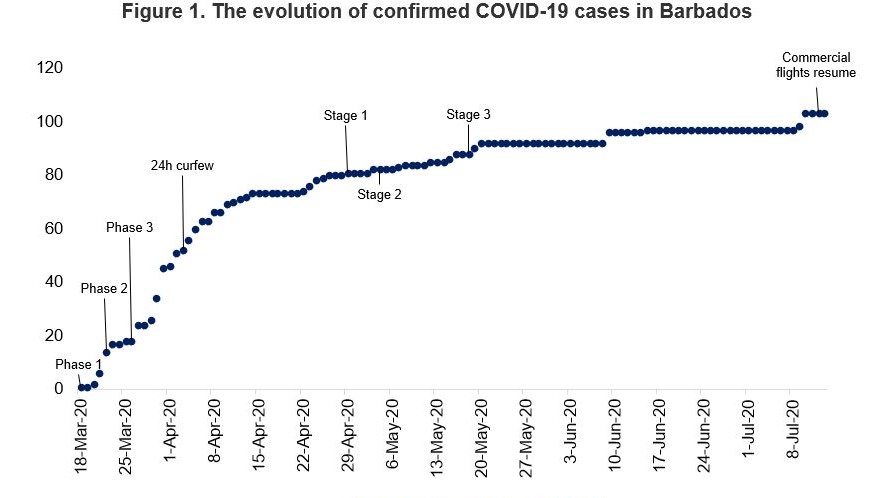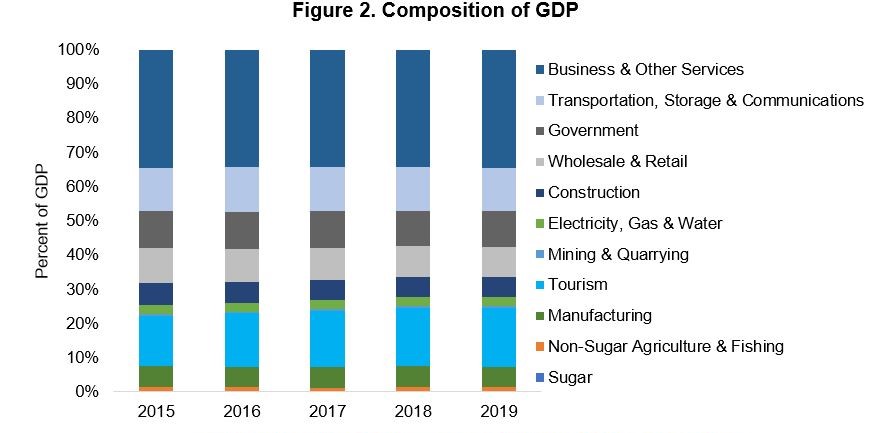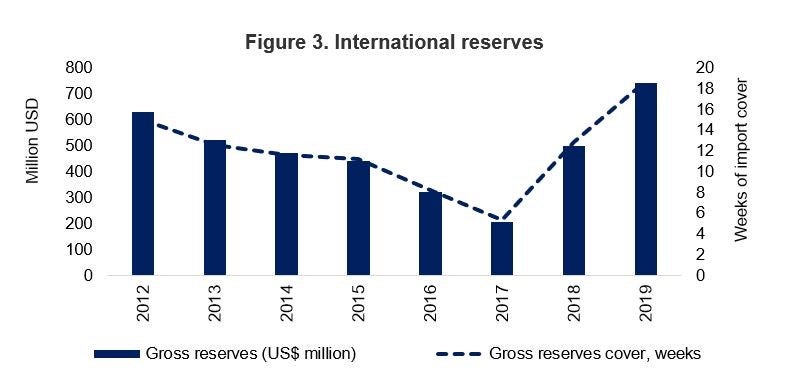COVID-19 in Barbados is proving to be a perfect example of what Nassim Nicholas Taleb termed a “black swan”. It is a rare event, with an extreme impact and which, in retrospect, could have been predicted. As discussed in our latest Caribbean Quarterly Report July 2020, the pandemic reached Barbados in March 2020 and has since been putting both lives and livelihoods at stake in three main ways:
1. The health crisis
Barbados is a regional hub for travel and tourism, which has exposed it more to imported cases than other countries in the region. Strict social distancing measures, contact tracing, and the expansion of testing have been key to flattening the curve. These have been complemented by both higher funding for the health sector and additional health workers. As seen in the figure below, the country closed down in three phases, starting at the end of March 2020 and following WHO protocols. The reopening took place in three stages once there were signs of flattening the epidemiological curve.

2. A halt in economic activity
Between March and July 2020, Barbados experienced a sudden stop in tourism arrivals, with devastating effects on employment and economic activity on the island. Tourism is the main driver for growth, accounting for 17.5% of GDP in 2019 and directly employing over 12% of the labor force. Since March, unemployment claims have rapidly increased, reaching over 20% of the workforce by June and increasingly pressuring the capacity of the National Insurance Scheme to meet this growing demand. In addition to the ripple effect lower tourism activity has had on the rest of the economy, the setting of curfews and lockdowns (whilst key to slowdown the spread of the virus) negatively impacted other key sectors for the economy such as business and other services (34.5% pf GDP in 2019) or the wholesale and retail sectors (9% of GDP in 2019). The economic impact has had a severe implication on the IMF program, currently being implemented in Barbados. Although the country passed its third review under the program, the targets going forward have had to be revised substantially.

3. A reduction in international financial flows
International financial flows are being negatively impacted as COVID-19 affects key source markets such as the UK, USA and Canada. These flows take the form of investments (e.g., portfolio or direct investment), other financing flows (e.g., debt), or transfers (e.g., private remittances). Lower international financing flows and tourism receipts will have negative effects on the level of reserves, which is key to maintain the exchange rate peg and to pay for imports. Given the country’s reliance on imports for consumption, production and construction, avoiding disruptions to imports is essential for Barbados.
What can the IDB do?
With the onset of the crisis in the region, the IDB identified four priority support areas for countries affected by COVID-19. Among several other measures, the Bank adjusted its lending instruments to streamline support for countries affected by COVID-19, and streamlined fiduciary processes and timeframes for approving operations in order to maximize and accelerate its support to borrowing member countries at this critical time.
In Barbados, the IDB Group has swiftly escalated its support – offering a comprehensive and bold response package, covering both short-term, urgent needs as well as maintaining long-term investments in key areas of national development. All in all, the expected 2020 IDB disbursements for Barbados in its sovereign-guaranteed branch (public sector) are about US$200 million. This represents a huge leverage from the traditional engagement of the Bank with Barbados.
This response has focused mainly on the following areas:

The scale and magnitude of the COVID 19 crisis is still to be fully defined; with the history of the global economy likely to be described as ‘before-COVID’ and ‘after-COVID’. For small island nations like Barbados, the impact of the pandemic is expected to be severe given its economic reliance on tourism, the high costs associated with insularity and the already existing challenges such as vulnerability to climate change and natural disasters. Before the onset of the pandemic, Barbados was in the midst of significant reforms to improve its prospects for the future; the COVID-19 crisis represents a major setback. However, both the Government and people of Barbados have demonstrated a great amount of resilience when faced with hard times in the past. The IDB Group has been able to articulate a strong, quick, and customized response to the COVID-19 crisis. The challenges ahead are not minor, but Barbados can be assured of having a committed partner in this joint effort.
1 https://www.iadb.org/en/news/idb-supports-modernization-barbados-regulatory-framework



Leave a Reply